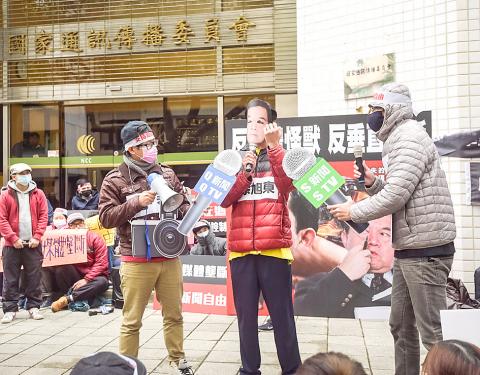Far EasTone Telecommunications Co Ltd (遠傳電信) yesterday said it is withdrawing a NT$74.5 billion (US$2.39 billion) buyout bid for local cable TV operator China Network Systems Co Ltd (CNS, 中嘉網路), along with its partner Morgan Stanley Private Equity Asia IV’s (MSPE), due to a lengthy regulatory review.
The telecoms’ comments came after CNS’ major shareholder, MBK Partners LP, and MHPEA Chrome Holding BV, a subsidiary of Morgan Stanley, agreed to initiate a revocation of the acquisition deal. The investment project was touted as one of the largest cable TV acquisition deals in recent years in the nation.
“To prevent the review of the deal from affecting the company’s operational development and plans, the company, MBK and MSPE have agreed to initiate the revocation [of the bid],” CNS said in a statement yesterday.

Photo: Huang Yao-cheng, Taipei Times
The National Communications Commission (NCC) has requested a second review of the case, despite giving a conditional go-ahead to the acquisition in January last year.
The Fair Trade Commission also approved the deal in 2015.
Facing mounting criticism, the Investment Commission returned the case to the NCC for further review to clarify if the deal violates regulations barring investment in media outlets by the government, political parties and the military.
The developments “are different from what we originally expected,” Far EasTone said in a separate joint statement with MSPE.
Speculation swirled that MSPE was withdrawing its application because of the slim chance that it would receive regulatory approval.
In July 2015, MSPE offered to buy a significant stake in CNS from MBK through a holding company called North Haven Private Equity Asia IV LP (NPHEA).
Far EasTone would indirectly own a stake of CNS, as it spent about NT$17.12 billion in cash subscribing to corporate bonds issued by NPHEA’s local subsidiary.
The deal would have allowed Far EasTone to complete the last piece of its digital convergence drive, as the partnership with MSPE would have helped it tap into the nation’s cable TV and fledgling smart home markets.
CNS has a 25.7 percent share of the local cable TV market, with 1.29 million subscribers.
Far EasTone said it does not plan to invest in cable TV companies as long as the government does not relax restrictions on the government, political parties and military holding stakes in media outlets.
The telecoms is restricted from buying a stake in CNS because government funds hold an unspecified share of Far EasTone.
“The law is obsolete,” Far EasTone said.
The company said it plans to allocate the NT$17.12 billion to foster digital convergence and deepen its cooperation with content providers and over-the-top operators.
The company added that its collaboration with CNS would not be affected by the cancelation of the acquisition deal.
NCC spokesman Wong Po-tsung (翁柏宗) said the commission has yet to receive requests from CNS or MSPEA to withdraw their applications.

The CIA has a message for Chinese government officials worried about their place in Chinese President Xi Jinping’s (習近平) government: Come work with us. The agency released two Mandarin-language videos on social media on Thursday inviting disgruntled officials to contact the CIA. The recruitment videos posted on YouTube and X racked up more than 5 million views combined in their first day. The outreach comes as CIA Director John Ratcliffe has vowed to boost the agency’s use of intelligence from human sources and its focus on China, which has recently targeted US officials with its own espionage operations. The videos are “aimed at

STEADFAST FRIEND: The bills encourage increased Taiwan-US engagement and address China’s distortion of UN Resolution 2758 to isolate Taiwan internationally The Presidential Office yesterday thanked the US House of Representatives for unanimously passing two Taiwan-related bills highlighting its solid support for Taiwan’s democracy and global participation, and for deepening bilateral relations. One of the bills, the Taiwan Assurance Implementation Act, requires the US Department of State to periodically review its guidelines for engagement with Taiwan, and report to the US Congress on the guidelines and plans to lift self-imposed limitations on US-Taiwan engagement. The other bill is the Taiwan International Solidarity Act, which clarifies that UN Resolution 2758 does not address the issue of the representation of Taiwan or its people in

US Indo-Pacific Commander Admiral Samuel Paparo on Friday expressed concern over the rate at which China is diversifying its military exercises, the Financial Times (FT) reported on Saturday. “The rates of change on the depth and breadth of their exercises is the one non-linear effect that I’ve seen in the last year that wakes me up at night or keeps me up at night,” Paparo was quoted by FT as saying while attending the annual Sedona Forum at the McCain Institute in Arizona. Paparo also expressed concern over the speed with which China was expanding its military. While the US

SHIFT: Taiwan’s better-than-expected first-quarter GDP and signs of weakness in the US have driven global capital back to emerging markets, the central bank head said The central bank yesterday blamed market speculation for the steep rise in the local currency, and urged exporters and financial institutions to stay calm and stop panic sell-offs to avoid hurting their own profitability. The nation’s top monetary policymaker said that it would step in, if necessary, to maintain order and stability in the foreign exchange market. The remarks came as the NT dollar yesterday closed up NT$0.919 to NT$30.145 against the US dollar in Taipei trading, after rising as high as NT$29.59 in intraday trading. The local currency has surged 5.85 percent against the greenback over the past two sessions, central